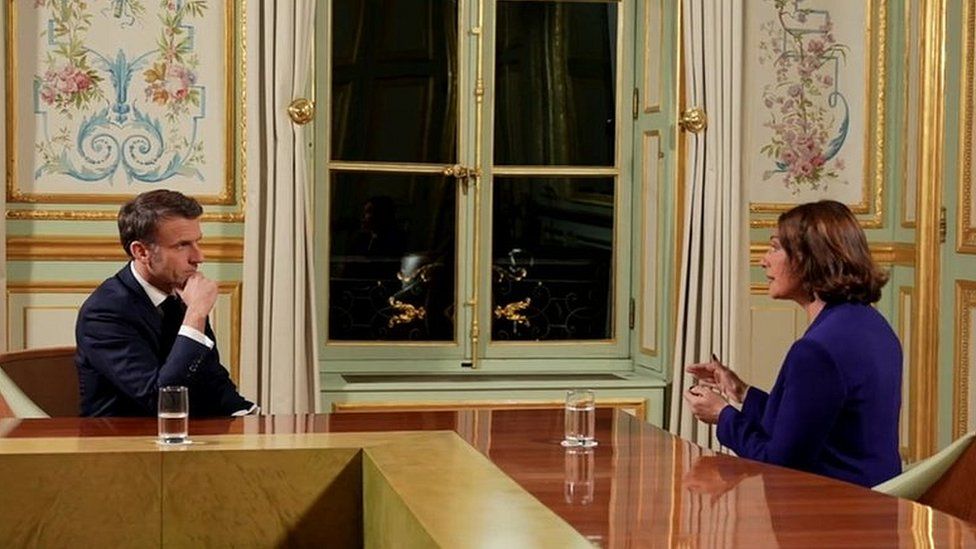
By Katya Adler
Europe editor, Paris
Far from a distant observer, one of a chorus of countries offering opinions on the Israel-Gaza war, France feels very much caught up in the conflict.
A recent YouGov poll suggested over 70% of French men and women fear Middle East tensions and violence could well spill over at home. There are fears about general security, as well as concerns about antisemitism and Islamophobia.
The French authorities have reported a steep rise in antisemitic acts across the country.
On Friday, during our wide-ranging conversation at the Élysée Palace in Paris, President Emmanuel Macron spoke about the multiple challenges facing the world today, from climate change to combating global inequality, to the importance of continuing to support Ukraine against Russia. But when it came to the Middle East, the language the French president used was particularly emotive.
On a number of occasions he listed the women, the babies, the old people in Gaza who, he said, had nothing to do with terror attacks, being killed in bombings by Israel. He insisted there was no justification for that and the bombing campaigns must stop. Palestinian lives matter, he said, humanitarian law must be respected.
In stark contrast to Washington, which has ruled out the idea of a ceasefire for now, Mr Macron repeated over and again during our conversation that to protect Gaza civilians a humanitarian ceasefire was needed. He urged Israel to accept one and said he hoped other world leaders, including in the US and the UK, would make the same case.
At the same time as outlining why he believes there should be a humanitarian ceasefire in Gaza, Mr Macron also spoke with empathy for Israel following the Hamas massacre of about 1,200 people, mainly civilians, and the hostage-taking of almost 240 others, including French citizens, just over a month ago.
“We work very hard to try to protect our people there,” he told me. “We unhappily lost more than 40 French nationals and we still have hostages and when I speak about that first I think about our families.”
Hamas governs Gaza and is designated a terrorist organisation by many Western countries including the UK.
Emmanuel Macron told me he was one of the first world leaders to call Israel’s president and prime minister. “We share their pain and we share their willingness to get rid of terrorism. We know what terrorism means in France,” he said.
France has been the focus of a number of Islamist attacks in recent years. Since 2014, more than 260 people have been killed, according to France’s Interior Ministry, and 1,200 people injured.
Mr Macron said France “clearly condemned the terrorist attack and the (Hamas) terrorist group and recognised Israel’s right to protect itself and to react”. But from Day One, he emphasised, “France said Israel’s reaction must respect the international rules of war and international humanitarian law”.
Did he believe Israel was flouting those laws in its military action in Gaza, I asked. The UN Secretary General says Gaza is turning into a graveyard for children.
With passions so inflamed across the Middle East as well as in France, Mr Macron said one month after Israel suffered such a devastating attack “I think it would not be the right way to deal with a partner and a friend, to say you will be condemned and you’re guilty. I’m not a judge. I’m a head of state. I just remind everybody of international law. I call for the ceasefire.”
A ceasefire would benefit Israel, said Mr Macron, because the images of its military strikes in Gaza, seen around the world, were fuelling resentment. “It’s impossible to explain: we want to fight against terrorism while killing innocent people,” he said.
In reality, President Macron’s words have far more impact back home than in the Middle East where, unlike the US, Iran or Egypt, for example, France is not viewed as hugely influential in the Israel-Hamas conflict.
In Paris meanwhile, a demonstration planned for this Sunday against antisemitism has become highly politically charged – largely because Marine Le Pen’s hard right National Rally party will participate.
Mr Macron has called for France to http://popicedingin.com/ unite “without ambiguity” against antisemitism. He said there would be “no mercy shown in France for those inciting hatred”, but also he has made headlines at home after his team announced he would not attend the demo in person.